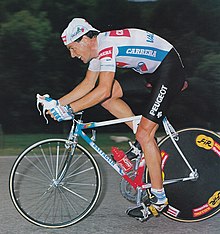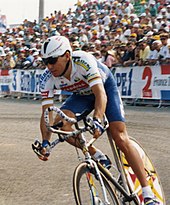Stephen Roche
In a 13-year professional career, he peaked in 1987, becoming the second of only three cyclists to win the Triple Crown of victories in the Tour de France and the Giro d'Italia general classification, plus the World road race championship, the others being Eddy Merckx and Tadej Pogačar.
On completion of his apprenticeship as a machinist in a Dublin dairy and following a successful amateur career in Ireland with the "Orwell Wheelers" club coached by Noel O'Neill of Dundrum (which included winning the Irish Junior Championship in 1977 and the Rás Tailteann in 1979), Roche joined the Athletic Club de Boulogne-Billancourt amateur team in Paris to prepare for the 1980 Olympic games in Moscow.
In the 1985 Tour de France Roche won stage 18 to the Aubisque and finished on the podium in 3rd position, 4 minutes and 29 seconds behind the winner Bernard Hinault.
In 1986 at a six-day event with UK professional Tony Doyle at Paris-Bercy, Roche crashed at speed and damaged his right knee.
By the end of his career Roche was unable to compete at his best because of a back problem which led to a loss of power in the left leg.
In the spring, he won the Volta a la Comunitat Valenciana, taking a third victory in the Tour de Romandie and fourth place plus a stage win in Paris–Nice.
Following Bernard Hinault's retirement, Laurent Fignon's choppy form and with Greg LeMond injured following an accidental shooting while hunting, the 1987 Tour was open.
On stage 21, crossing the Galibier and Madeleine and finishing at La Plagne, Roche attacked early, was away for several hours but was caught on the last climb.
[4] The yellow jersey (worn by the leader of the general classification) changed hands several times with Charly Mottet, Roche, Jean François Bernard and Delgado all wearing it before Roche used the final 35 km (22 mi) time trial to overturn a half-minute gap and win the Tour by 40 seconds, which was at the time the second-narrowest margin (in 1968 Jan Janssen had beaten Herman Van Springel by 38 seconds; two years after Roche's victory, Greg LeMond beat Laurent Fignon by 8 seconds).
Later that year, with victory at the World road race championship in Villach in Austria, Roche became only the second to win the Triple Crown of Cycling.
Roche arrived with insufficient training although he worked during the 23-lap, 278 km (173 mi) undulating terrain for his teammate Sean Kelly and escaped in the race-winning break only while covering for his countryman.
With Moreno Argentin in the following group, Kelly did not chase and as the break slowed and jostling for position began for a sprint, Roche attacked 500 m (1,600 ft) from the finish and crossed the line with metres to spare.
[5] At the close of 1987, Roche moved to Fagor MBK, bringing English riders Sean Yates and Malcolm Elliot, 1984 Tour de France King of the Mountains winner Robert Millar and domestique Eddy Schepers.
[8] Roche retired at the end of an anonymous 1993 which yielded a single win, in the post-Tour de France criterium at Chateau Chinon.
In May 1990, Paul Kimmage – a former professional and teammate of Roche at Fagor, as well as a fellow Dubliner – published an account of life in the peloton.
His book Rough Ride exposed drug use apparently endemic in the peloton but spoke in fawning terms about Roche.
[10] In March 2000 the Italian judge Franca Oliva published a report detailing the investigation into sports doctors including Conconi.
[12] Files from part of the investigation allegedly detail a number of aliases for Roche including Rocchi, Rossi, Rocca, Roncati, Righi and Rossini.
[16] In April 2022 a Spanish court found Roche guilty of fraud and ordered him to repay €733,866 to creditors of his bankrupt cycling holiday company in Majorca.
[17] Roche featured in a well-known Irish television advert for Galtee cheese in 1987, shortly after winning the Tour de France.

